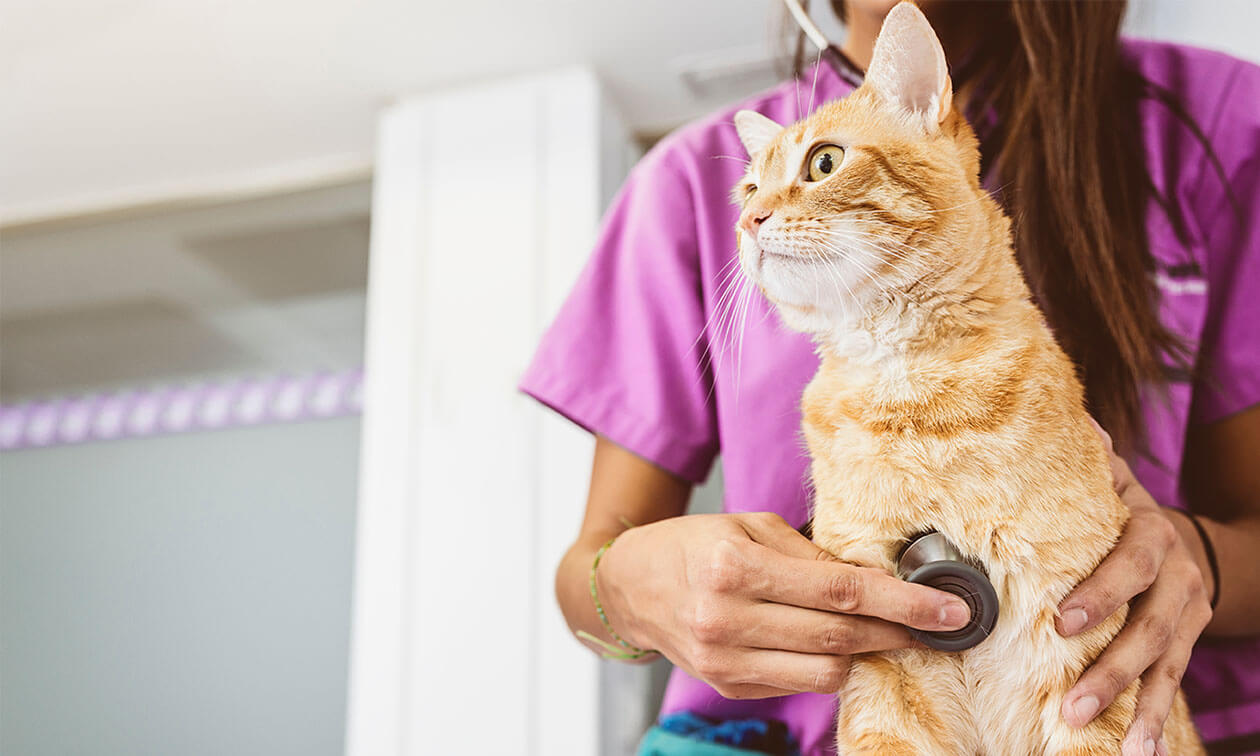If your cat has been diagnosed with a heart murmur, it’s natural to feel concerned. Our pets having any heart condition can feel overwhelming, but knowledge is power — whether you have a cat with a heart murmur or you want to be informed (just in case).
What Is a Feline Heart Murmur?
A heart murmur is an abnormal heart sound. When the heart beats and blood flows through the chambers, it creates noise, referred to as heart sounds. Veterinarians listen to these sounds with a stethoscope as a diagnostic tool.
The first two high-pitched sounds they should hear are “lub” and “dub.” If your vet also hears a “whooshing” sound, that means a heart murmur is present.
That “whooshing” is the sound of turbulent blood flow within the heart or the large vessels leaving the heart. The turbulence is due to the blood flowing more quickly than normal. The amount of turbulence determines the loudness of the murmur but not the severity of the condition. For example, a cat can have a loud murmur with only small defects. On the other hand, it is possible to have a serious heart condition without a murmur.
Heart murmurs are not always caused by a heart or vessel problem. In fact, 50% of heart murmurs are not associated with any underlying heart or vessel disease.1 If you suspect your cat has a heart murmur, be sure to contact your veterinarian.
Heart Murmur Scale
Murmurs are graded on a scale of I to VI. The lower the grade, the milder the murmur. The grade goes up based on how loud the murmur is and the size of the area over which it can be heard.
- Grade I murmur: Soft, heard intermittently, and difficult to hear. It may only be heard at one location on the chest.
- Grade II murmur: Soft and can be difficult to hear
- Grade III murmur: Easily heard.
- Grade IV murmur: Loud and can be heard on both sides of the chest.
- Grade V murmur: Loud, heard on both sides of the chest, and a vibration can be felt across the chest wall.
- Grade VI murmur: Can be heard without the use of a stethoscope.
Age of Cats with Heart Murmurs
Middle-aged and senior felines around seven years and older are most commonly affected by heart murmurs compared to younger cats. Younger cats with heart murmurs are generally born with heart disease. Kittens between six and eight weeks can have heart murmurs, but they usually resolve as they age.
Causes of Heart Murmurs in Cats
Generally, a heart murmur indicates an underlying heart condition, but there can be other causes.
An “innocent” heart murmur can happen in young kittens, caused by fast flowing blood within the heart. They are usually harmless, cause no symptoms, and typically disappear by the time a kitten reaches five months of age. Anemia, from something like a flea infestation, can also cause a heart murmur in kittens.
Cats can develop heart murmurs from structural problems within the heart. Hypertrophic cardiomyopathy is a common cause in adult cats. Kittens can be born with structural defects in the heart that can cause murmurs.
Other conditions that can cause heart murmurs include:
- Infection
- Fever
- Increased blood pressure
- Anemia
- Hyperthyroidism
- Obesity
- Pregnancy
- Emaciation
- Low protein levels in the blood
Signs of Heart Murmurs in Cats
Signs can be subtle or absent until the disease progresses. Cats are great at hiding discomfort, making an early diagnosis tricky unless it’s caught during a routine veterinary exam. The most common clinical signs include:
- Poor appetite
- Weight loss
- Stunted growth in kittens
- Breathing issues
- Pale gums
- Lethargy
- Weakness
If you notice any of these signs, contact your veterinarian right away.
How Your Veterinarian Will Diagnose Your Cat’s Heart Murmur
A heart murmur is typically detected during a physical examination by a veterinarian. The severity of the heart murmur, the age of your cat, and other clinical signs determine what additional tests will be recommended by your veterinarian.
If the murmur is detected in a six to eight-week-old kitten, your veterinarian may recommend a re-evaluation in a few weeks to see if the murmur resolves on its own. If not, your veterinarian will likely recommend an echocardiogram, an ultrasound of the heart. 40% of heart murmurs are associated with a congenital defect2 that an echocardiogram will help your veterinarian find.
Stress, excitement, or variations in heart rate commonly change the intensity of murmurs. If your cat is extremely stressed or anxious, and your veterinarian hears a murmur, they may recommend a re-evaluation once your cat is calmer.
Your veterinarian may recommend additional tests such as measuring blood pressure, chest X-rays, an electrocardiogram (ECG), an echocardiogram, or additional lab tests to diagnose the cause of the murmur.
Treatment for Heart Murmur in Cats
Not all heart murmurs require treatment. In those cases, routine monitoring is critical in case the condition gets worse down the road and requires treatment.
The cause of the heart murmur will determine the best treatment. Treatment will be tailored to manage the underlying cause and can include a specialized diet, medications, supplements, and supportive care.
When treatment is necessary, it’s focused on the root cause and may include:
- Prescription diets. These are tailored to the underlying issue (such as low-sodium for heart disease or iodine-restricted for hyperthyroidism).
- Medications. These can help manage heart function or related symptoms.
- Supplements. These may include omega-3 fatty acids, taurine, and CoQ10.
- Supportive care. This can include fluids to help with hydration, nutritional support, heart and respiratory rate monitoring, and stress reduction.
As you can see, there are many tools you and your veterinarian can use to manage your cat’s heart murmur. It’s important to talk with your veterinarian to find the best plan for your cat.
ZPC-04570
- Heart murmurs and heart disease. Cats Protection Veterinary Guide 11. Page 2. https://www.cats.org.uk/media/1040/vg11_heart_murmurs_and_heart_disease.pdf. Accessed March 28, 2024.
- Prevalence and Clinical Significance of Heart Murmurs Detected in Cardiac Auscultation in 856 cats. National Library of Medicine. https://www.ncbi.nlm.nih.gov/pmc/articles/PMC9611806/. Accessed March 28, 2024



